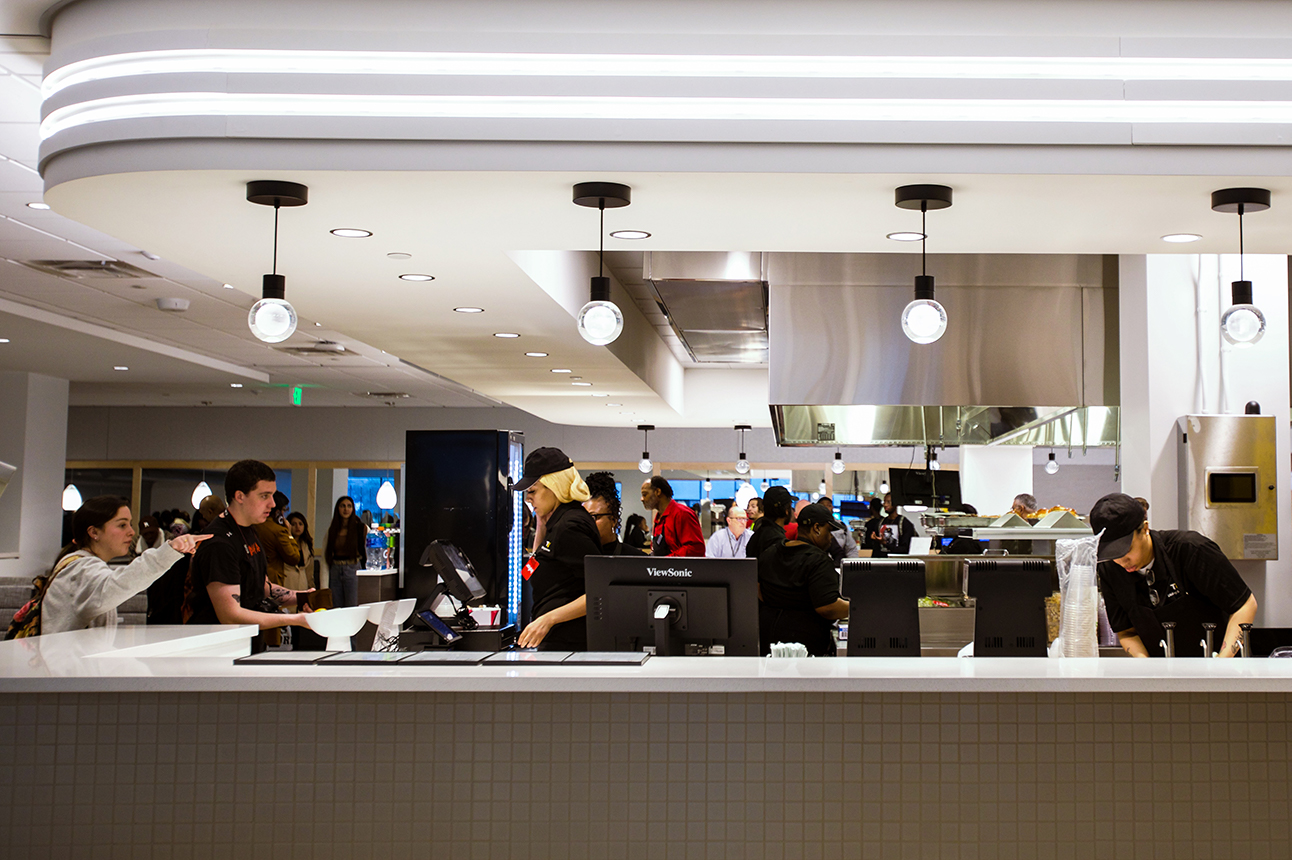
Towson, Aramark respond to student dissatisfaction with dining services thus far
By Gabriel Donahue, Editor-in-Chief
In its first three weeks as Towson University’s dining vendor, Aramark Collegiate Hospitality has not been entirely popular with students as it works to meet expectations and demand.
Some students have reported issues getting enough food at the dining halls, limited variety in options and feeling restricted in their meal plans.
Vernon Hurte, vice president for Student Affairs, sent a campus-wide email on Sept. 7 acknowledging the concerns, stating that Aramark understands dining to be a “vital part” of campus life.
“Feedback has been clear and helpful in ensuring TU’s dining experience matches the quality and expectations of our entire community,” Hurte wrote. “We’re pleased to share Aramark is taking feedback seriously and actively responding to address concerns quickly.”
Aramark expanded the Tiger Meal menu for all retail locations Wednesday. Tiger Meals are pre-determined meals available at the retail dining locations, including at the Union and West Village Commons.
“We will continuously evaluate the Tiger Meals at each location to ensure variety and guest satisfaction,” an Aramark spokesperson said in an emailed statement Thursday.
Additionally, they said Aramark is adjusting staffing according to student patterns and encourages its team to “remove any food that does not meet our expectations.”
Student feedback
Some students have reported that the dining halls have been running out of food.
Samuel Smith, a commuter who often goes to the dining halls while on campus, said that even when he goes in the morning, there is not as much food put out as there used to be when Chartwells Higher Education was the dining vendor.
Towson ended its contract with Chartwells after over 40 years in July.
The issue comes as Towson welcomes its largest incoming class of freshmen, increasing demand for the dining halls.
Meal plans are required for residents in all the dormitories except for apartment-style halls like Marshall and Barnes Halls, which freshmen are ineligible for, according to Towson’s “living on campus” webpage.
“I understand it’s a new company and there’s an unprecedented amount of students, but they knew this and should have taken it into account,” sophomore Maille Hynes said.
Kayla Alston, a freshman, said Glen Dining Hall tends to run out of food, especially pizza, at lunch time.
The Towerlight conducted a poll on its Instagram page on Sept. 4. Asked if they are enjoying the food from the dining vendor, 79% of respondents voted “no.”
268 people voted in total.
The Towerlight also provided users the opportunity to comment their thoughts in an open-ended survey question, and received 58 responses.
Many respondents noted a lack of variety at the dining halls compared to the offerings in previous years.
“The limits and options are just not good,” wrote one respondent.
Ghaffar Kukoyi said he dislikes that food isn’t made to order anymore. Instead of being able to order food at the grill in some dining halls, the dining staff makes food on the grill and sets it out for students to take.
“I kind of wish they went back to what they did last year,” Kukoyi said.
Some students have also expressed frustration with the new system of meal plans.
Students have the option of the bronze, silver, gold or platinum packages. Each package increases in price and has varying quantities of Tiger Meals and dining dollars, previously called points.
The bronze package, which costs $2,600 per semester, is the only package which does not have any dining dollars, the meal plan webpage shows.
All plans give students unlimited meal swipes to the dining halls. Previously, students were given a set amount that could be budgeted throughout the week before resetting early Friday morning. These options included 10, 14, 19, or 21 meal swipes per week, and could be used at any on-campus eatery.
Now, retail dining locations do not accept meal swipes, only Tiger Meals.
One poll respondent questioned why they bought a block plan when there are “almost no food choices that i can use meals for.”
Only the platinum package, which costs $3,500, provides the option of dining at a retail location once a day per week, having seven weekly Tiger Meals. The gold, silver and bronze packages have four, one and zero weekly Tiger Meals, respectively.
“I feel like if it’s going to be more expensive, it shouldn’t be more restrictive,” Hynes, who has the silver package, said of the new meal plans.
Without Tiger Meals, students with those meal plans who want to eat at the Union or other retail locations have to pay out of pocket or use dining dollars, which are limited in other plans.
Dining dollars are exempt from the 6% Maryland state tax, but are otherwise equivalent to $1, according to the OneCard portal FAQ page.
Additionally, students commented on a lack of vegetarian and vegan options, smaller portions being served and no allergen labels.
Smith said that the staff he asked at Newell Dining Hall could not tell him allergen information for the food.
“I’m playing Russian roulette at the dining halls,” he said.
Not all students have felt negative toward Aramark, however.
Freshman Madeleine Stassen said that while desserts tend to run out at West Village, which she called “disappointing,” she is pretty satisfied with the dining experience.
“It offers a well balanced diet for sure,” she said.
For junior Caden Conrad, the dining halls seem the same overall, and he said there is plenty of variety at Glen and West Village.
Conrad added that his opinion is unpopular.
Correction: This article has been updated to correct the pricing of the bronze meal plan. It is $2,600 per semester, not per year. The Towerlight regrets this error.

